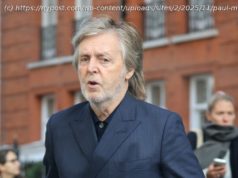The pianist Mr. Burrell is the lifetime-achievement honoree at the Vision Festival, where the two rejoined forces for a fiery set.
The pianist Dave Burrell sat onstage at Roulette on Wednesday, his sizable frame stooped over the keyboard with a combination of studious grace and earnest fascination. From his hands came a slow, elegant tidewater of chords, unresolved and Impressionistic. The tune was “Crucificado,” an original that he first performed in the 1970s in Archie Shepp’s band.
Mr. Shepp, a tenor saxophonist who was one day shy of 81, was perched a few feet away. A standing-room-only crowd filled every crevice of the Brooklyn theater, which was celebrating the kickoff of the 23rd annual Vision Festival.
Mr. Burrell is the lifetime achievement honoree at this year’s event, which continues through Monday, and Wednesday’s concert celebrated his work from various angles. Rarely does the spotlight fall so squarely on Mr. Burrell. He reflects the pianist’s archetype in some ways — a composer, a historian, an omnivore, a strategist — but not in others. He is uncommonly good at guiding and helping to sustain a group without taking up a lot of space, even in the most hot-blooded flurry of group improvising. Now 77, he remains defined by his sideman work, though his ambitious works as a bandleader and composer has helped connect anarchic avant-gardism with a vast historical family of music from America, Europe and Africa.
On Wednesday Mr. Burrell played three energizing sets — but fittingly, the centerpiece was billed as a performance by the Archie Shepp Quartet. In the late 1960s and ’70s, Mr. Shepp — a more well-known figure in jazz, and now a National Endowment for the Arts Jazz Master — was Mr. Burrell’s steadiest employer. Together they represented something like an allied force for strong, perceptive memory and compositional vision within the avant-garde insurgency.
[ Never miss a pop music story: Sign up for our weekly newsletter, Louder.]
Just as the free-jazz revolution touched off by Ornette Coleman, Cecil Taylor and John Coltrane pried open a door to the void — a wholesale, Afro-pessimist critique in sonic form — Mr. Burrell and Mr. Shepp kept faith with an American romantic lineage that included hymns, Billy Strayhorn’s tuneful compositions and even Broadway composers like Leonard Bernstein.
After a few years in Taylor’s ensemble, Mr. Shepp began recording on his own, mixing poetry with a warbling and slippery saxophone sound. His playing was articulate if not directly linguistic; he gave his notes respect and distinction, but not necessarily a neatly-bounded place in the measure like a classic bebopper would have.
Most avant-garde horn players then were letting go of the piano and all other chordal instruments, not to mention the structures of song form. It was a centrifugal moment, interested in breaking free more than moving toward an articulable goal.
Mr. Shepp’s mind worked a little differently, and his mid-1960s work is rich with the tension between slippage and structure. He’s a kind of social theoretician as well as a musician, a long-game thinker who was helping to found the Umbra Poets Workshop and worked on stage presentations at the Living Theater, years before the dawn of the Black Arts movement.
When he met Mr. Burrell in 1964, he noticed the younger man’s openness and interest in developing a broad-minded, studied approach to radicalism. “I could see the magic already brewing,” Mr. Shepp said on Wednesday, sitting backstage beside Mr. Burrell an hour before showtime. The two musicians took turns reminiscing in rolling baritones, often reminding each other of accolades the other had received or works they ought to mention.
Arriving in New York in the mid-1960s, Mr. Burrell recognized that a young pianist seeking admittance to the so-called “new thing” would need an original approach, given the hostility of many musicians to the strictures of chords.
“I went into a realm of making myself relevant — playing the heads, for example, of Marion Brown’s pieces with him,” Mr. Burrell said, explaining that when he began working with Mr. Brown, a saxophonist, he started to simply play the melodies along with him, rather than embellishing or imposing harmony. “That was my calling. It made me important to the ensemble.”
In 1969, soon after Mr. Burrell joined Mr. Shepp’s band, they traveled together to Algeria for a performance at the Pan-African Festival, hosted by the Organization for African Unity. Mr. Shepp encountered a group of Tuareg musicians, and the band recorded with them on the remarkable “Live at the Pan-African Festival.”
The musicians found themselves “welcomed with open arms,” Mr. Burrell remembered. “I felt free. We were able to wear African clothing and be proud to have come back.”
Traveling to Paris after Algiers, Mr. Shepp and Mr. Burrell brought that boundless feeling into another rare opportunity: They found an odd conglomerate of American expatriate musicians living in Europe, many of whom rarely mingled with each other. Some were young upstarts from Chicago — Lester Bowie, Roscoe Mitchell, Malachi Favors — while others were established hard-bop musicians, such as Hank Mobley and Philly Joe Jones.
Far from home, both Mr. Shepp and Mr. Burrell found themselves in a favored position, drawing from the inside and the outside, uniting generations and approaches. They each recorded multiple albums under their own names, some of the more notable of their careers. (For Mr. Burrell, the highlights were “Echo” and “After Love;” for Mr. Shepp, “Blasé” and “Yasmina, a Black Woman.”)
Soon after returning from Paris, Mr. Shepp wrote and recorded “Attica Blues,” an album of trenchant orchestral free-funk decrying the oppression of prisoners at New York’s Attica prison, and all unfree people outside the penitentiary’s walls.
Mr. Burrell’s career as a composer has been marked by a similarly broad, socially attuned scope: He has written operas and long-form works, including the recent “Paradox of Freedom,” an anthem for slaves freed during the Civil War and their ancestors.
He performed the piece to open the first set at Wednesday’s lifetime-achievement celebration, playing in a quintet that, again, spanned generations: It included the influential alto saxophonist Darius Jones, 40, and the drum luminary Andrew Cyrille, 78.
As the piece’s chugging three-beat rhythm lifted off the ground, Mr. Jones smeared a sharp cry across the band’s upper limits; the trombonist Steve Swell came into his vicinity, and the pair tilted from warm harmonies into even hotter dissonances.
Start
United States
USA — Music Jazz Giants Dave Burrell and Archie Shepp Retrace Their Five-Decade History






